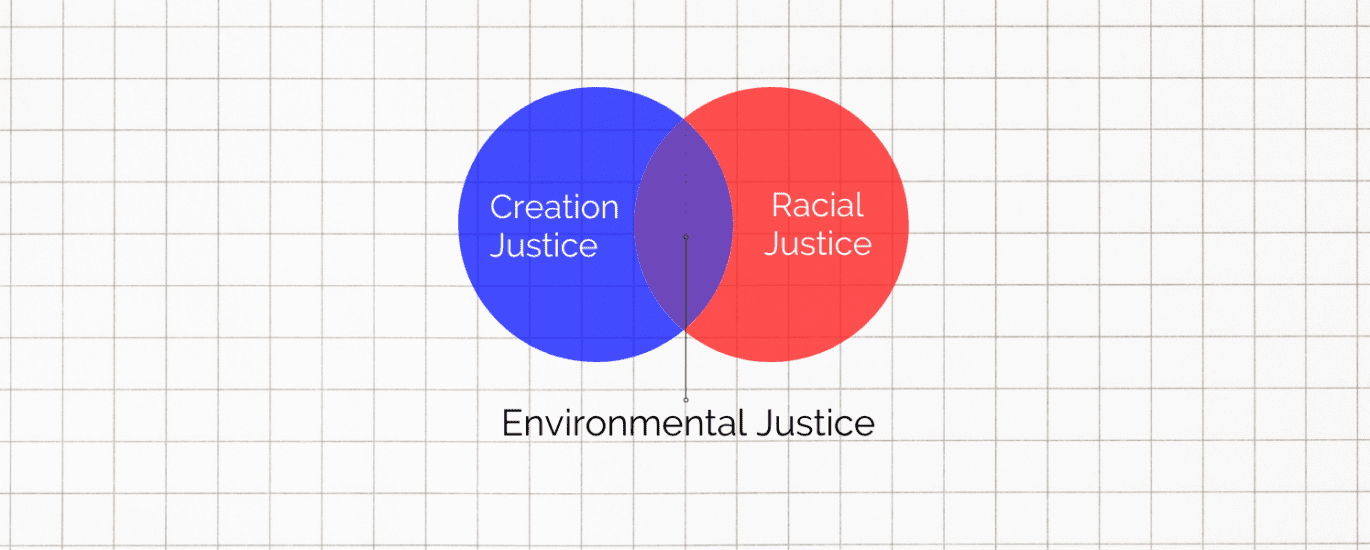By Betsy Sowers
What’s the first thing you think of when you hear the words “environmental justice?” Polar bears? Wilderness protection? If so, you’re mistaken . . . but you’re in good company. Environmental justice (or EJ) is commonly misunderstood as a synonym for climate justice or creation justice, even among progressive, justice-seeking Christians. In fact, EJ is a legal framework created to protect communities of color and low wealth from being overburdened by pollution and other environmental impacts. It is a critical subset of both creation justice and racial justice. Think of a Venn diagram with “creation justice” and “racial justice” as the intersecting circles. The large overlap is EJ. In other words, environmental justice is racial justice.
The legal definition of environmental justice dates to the Civil Rights Act of 1964 in the United States: “Environmental justice is the fair treatment and meaningful involvement of all people regardless of race, color, national origin, or income, with respect to the development, implementation, and enforcement of environmental laws, regulations, and policies. This goal will be achieved when everyone enjoys: The same degree of protection from environmental and health hazards, and equal access to the decision-making process to have a healthy environment in which to live, learn, and work.”[i]
You don’t have to look very far to see that we are a long way from that goal. The reason? Persistent, structural environmental racism. Since data were first collected more than 50 years ago, the best way to find pollution of every kind has been to find communities of color. The ongoing pattern is partly due to decades of redlining that restricted “desirable” residential areas to white people and clustered people of color near industrial facilities, near highways, and in areas prone to flooding.[ii] Environmental racism also persists in the failure of the Environmental Protection Agency (EPA) and state agencies to enforce EJ policies, as well as the copious loopholes in regulations, and the blocking of community access to decision-making, thanks to the influence of industry lobbyists.
Some of the results for communities of color include:
- Sacrifice Zones – people of color make up 69% of those living near clustered polluters;[iii]
- Breathing more polluted air and having less (or no) access to clean water;
- Lack of access to green and blue spaces, gardens, and fresh food;
- Heat islands—Redlined Black neighborhoods are 5-13 degrees hotter than non-redlined neighborhoods.
- Health impacts—physical, mental, and spiritual—higher rates of respiratory diseases (Black children die of asthma at 10 times the rate of white, non-hispanic children), cancer, neurological diseases, more deaths from COVID and other contagious illnesses.
- Lower educational performance correlated with pollution levels;
- Poor quality housing that emits more carbon from old heating systems and poor insulation and creates indoor air pollution;
- More flooding and more toxic runoff;
- Unequal assistance in the aftermath of climate disasters—white communities gain wealth following recovery efforts while communities of color lose wealth.
All of this, of course, is connected to the larger climate crisis: Hop Hopkins, Director of Organizational Transformation of the Sierra Club, says “You can’t have climate change without sacrifice zones, and you can’t have sacrifice zones without disposable people, and you can’t have disposable people without racism.”[iv] In other words, we won’t solve racism or the climate crisis without ending environmental injustice. Environmental justice is racial justice.
As members of the Alliance of Baptists who have committed ourselves to both racial and environmental justice as matters of faith, we have many opportunities for prayer and action at the intersection of racial and environmental justice. Many of you will recall our 2018 annual gathering, Earth: Beloved Community, and bible study leader Ched Myers’s call to Watershed Discipleship—learning about the challenges of climate and environmental justice right where we live, in the places we love, and becoming allies for environmental justice under the leadership of impacted communities. If you don’t already know the environmental injustice challenges near you, check the EPA EJ mapper to locate nearby designated EJ communities. There are often local EJ organizations led from within communities of color already in action. Find out how you can support them. If your congregation is in an EJ community, challenge nearby congregations to join you in the work of environmental justice.
You may also contact your state’s chapter of Interfaith Power and Light to find out whether and how they are engaged in the work of environmental justice. For federal legislative and policy actions, follow Creation Justice Ministries. With your congregation, study and consider adopting the Alliance’s policy statement, Earth: Beloved Community, which addresses EJ within the larger context of Creation Justice and integrates it into the theology and ministries of the whole church.
Finally, plan to join the Creation Justice Community of the Alliance this October, for a panel discussion on environmental justice with national leaders in the field. Watch for details soon. You can also follow us on Facebook for posts about environmental and creation justice. The members of the Alliance Creation Justice Community invite you into prayerful conversation and exploration of how to integrate a robust commitment to environmental justice into our prayers and actions for racial justice as we move toward becoming an antiracist community of faith.
[i] What is Environmental Justice?
[ii] Fears, Darryl, Redlining Means 45 Million Americans are Breathing Dirtier Air, 50 Years After it Ended, Washington Post, March 9, 2022
[iii] Statistics from a webinar with Dr. Robert Bullard, (The Father of Environmental Justice) Distinguished Professor of Urban Planning and Environmental Policy, Texas Southern University, March 12, 2021
[iv] Hopkins, Hop, Racism is Killing the Planet

The Rev. Betsy J. Sowers is Minister for Earth Justice at Old Cambridge Baptist Church in Cambridge, Massachusetts. Over the years she held many positions within the American Baptist Churches USA, as well as the Massachusetts Council of Churches. A clear call out of retirement to climate justice service has both surprised and energized her for another chapter of activist ministry.




Recent Comments